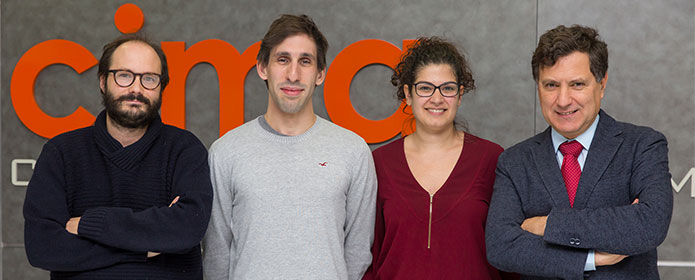2020-02-03-News-CIMA-Molecular Engineering
Intratumorally effective molecular and cellular engineering against cancer
Researchers from Cima and Clínica Universidad de Navarra develop a more effective and less toxic transient immunotherapy technique by means of transfer Genetics

Adoptive cell therapy is an immunotherapy subject that uses T lymphocytes (cells relevant for their antitumor function) to boost the patient's immune system against cancer. Its application is effective in the treatment of hematological tumors and also in melanoma, in which it obtains an success rate, at least partial, of 50%. However, its results in other solid tumors are not yet satisfactory.
Researchers from the Cima and the Clínica Universidad de Navarra have developed an experimental immunotherapy technique that dramatically increases efficacy in animal models. "Adoptive cell therapy consists of extracting T lymphocytes from the tumor, activating them, expanding them in the laboratory and re-infusing them into the patient. The conventional procedure is done by inducible expression; that is, a permanent but partially regulated expression. researcher But this process has demonstrated high levels of toxicity and safety in clinical trials," explains Iñaki Etxeberria, Cima predoctoral fellow and first author of work.
Engineering Genetics transient"Our group has implemented an engineering strategy Genetics based on the design of T cells to function in the tumor microenvironment. Specifically, we modified the gene expression of a proinflammatory cytokine (called interleukin-12) so that it becomes transient," says Dr. Ignacio Melero, researcher senior of the Immunology and Immunotherapy Program at Cima and Clínica Universidad de Navarra and director of work.
This novel approach confirms for the first time the antitumor effect of adoptive cell therapy in human endometrial cancer grafted in immunodeficient mice. It also improves treatment without apparent associated toxicity in models of melanoma, ovarian cancer and kidney cancer.
The conclusions of this work, carried out in partnership with the high school de Oncología Vall d'Hebrón and the high school Catalán de Oncología (Idibell), in Barcelona, have been published in Cancer Cella scientific journal of reference letter in the field of cellular and molecular oncology.

Another advance of this study is that a new form of administration has been described that improves the results of the conventional procedure . "Until now, adoptive cell therapy has only been tested intravenously. Our study demonstrates that the injection of the 'engineered' cells intratumorally (into the lesions) requires less preconditioning of the cells and is more effective," say the researchers at Cima.
Following the completion of the preclinical research process, which has included patient samples and a humanized endometrial cancer model , scientists are working on the implementation and validation of the procedures necessary for the approval and conduct of a pilot clinical essay at Clínica Universidad de Navarra.
-
reference letter bibliography:
Cancer Cell. 2019 Dec 9;36(6):613-629.e7

